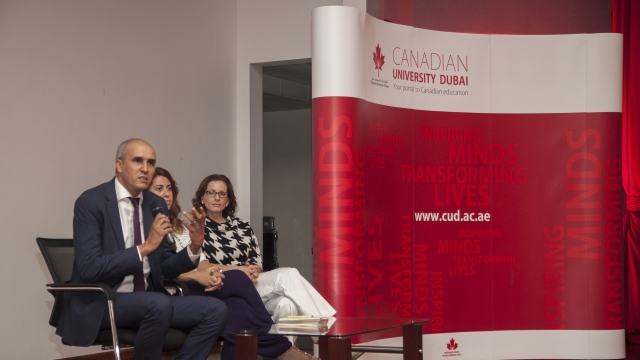November 2nd, 2015: Canadian University Dubai (CUD) has hosted a multi-disciplinary symposium on the issue of identity, bringing together the academic and literary communities in a stimulating debate surrounding one of the most relatable talking-points of life in the UAE.
Internationally-published author, Rewa Zeinati, joined professors of psychology, anthropology, communication and political science to discuss how identities are established, how they evolve, and how powerful they can be in achieving personal wellbeing and social cohesion.
Opening the symposium, professor of communications, Dr. Mohammed Ben Moussa, said that it was the phenomena of globalisation and multiculturalism that had imposed the identity debate on society, particularly in places like the UAE, that retain deeply rooted traditions while embracing cultural diversity.
In her keynote address entitled ‘Of cities and women and memory: how else are identities made?’ Ms. Zeinati went on to discuss the role of language in identity, and revealed some of the people and moments that had helped shape her own self, through extracts from her book, Nietzsche's Camel Must Die.
Psychology professor Dr. Louise Lambert spoke about the theories surrounding moral identity, citing Kohlberg’s three levels of moral development to illustrate the spectrum of morality, while Dr. Mustapha Tajdin challenged the notion that one’s identity is defined by one’s religion in his talk ‘Religious identity in a changing world’.
Tackling the issue of identity in a political context, Dr. Aziz Mulay Shah explored how international alliances can be built upon a shared sense of belonging. While many coalitions are created in response to a threat, he said, the theory of social constructivism suggests that identity is an important factor in successful cooperation.
He said, “The GCC itself is an alliance of members that have shared norms; a common Khaleeji dialect, a desert history and tribal dynamics, cohesive political and value systems, and they have all experienced rapid modernization. These common histories, experiences and values create a shared identity, which matters in keeping the alliance together.”
Dr. Franziska Apprich introduced science to the debate, talking about her latest research in autonomous sensory meridian response (ASMR). A little-known phenomenon, ASMR can induce pleasurable feelings that have been proven to help enhance the wellbeing of people facing issues that could affect their identity, such as depression and sleeping disorders.
Anthropology professor, Dr. Joanna Seraphim, spoke about self-identification, versus the perception of others, saying that it is endemic for people to judge each other based on their look, while the symposium concluded with a thought-provoking talk from Dr. Mahmoud Hamoud about the impact of media and communication on Palestinian national and cultural identity.
The event was organized by the School of Communication and Media Studies as a means of bringing students, academics and the wider community together to discuss some of the challenges, trends and talking points emerging in wider society.






